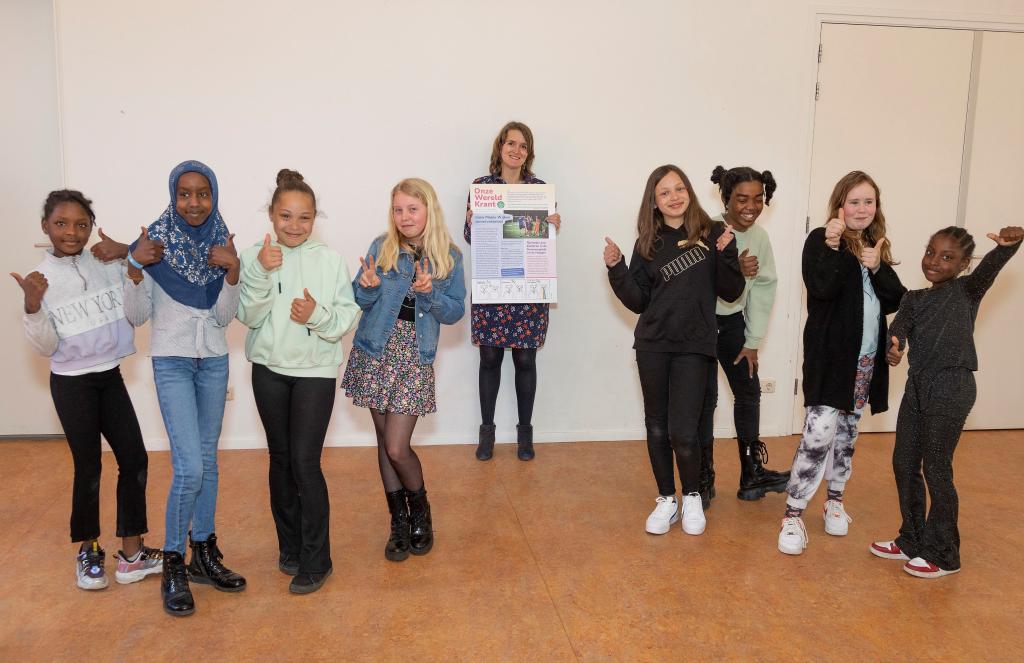Thessaloniki gets ready for its metro launch in November
The underground rapid transit lines have been under construction for almost two decades due to various project delays
 TheMayor.EU logo
TheMayor.EU logo 
The editorial team presenting the first issue of the children's newspaper, Source: Municipality of Groningen
It is hoped that more youngsters will develop the love for reading
On Wednesday afternoon, April 21, Groningen Alderman Carine Bloemhoff received the first copy of Onze WereldKrant (the name roughly translates as Our World Newspaper). The newspaper was conceived and prepared for and by children from two of the Dutch city’s neighbourhoods.
The edition appears in the context of a general revival of these districts and aims to reflect on children’s needs and vision for the future.
Earlier this month, Alderman Bloemhoff, responsible for the Old Neighbourhoods of Groningen, whose portfolio also includes education and participation, was honoured to receive the first issue of the children’s newspaper. She took the copy from its eight editors from Korrewegwijk and De Hoogte neighbourhoods.
To produce the newspaper, the kids did most of the work by themselves: they came up with the name, wrote the content and also worked on the design. Accordingly, it places the wishes of children at centre stage.
The initiative is part of a larger effort for district renewal in Groningen, implemented by Mooi Wijken (meaning 'beautiful neighbourhoods'), the Municipality and GoeieBuurt - residents' cooperative that works to make Korrewegwijk and De Hoogte more child-friendly.
The project focuses on themes such as poverty, greenery and spending time outside, safety, positive growth and pleasant, sustainable and healthy living. Local residents, entrepreneurs, housing corporations, schools, police, municipality and many other parties are building and working together to make this a reality. With this newspaper, Mooi Wijken also wants to contribute to making reading more attractive among children as well as to their improved language development.
The editorial team, consisting of eight girls, are planning to release at least one more issue after the summer holidays. Should the results prove successful, the project might continue in 2022 as well.

The underground rapid transit lines have been under construction for almost two decades due to various project delays

Now you can get your wine in Talence by paying directly in Bitcoin

That’s because the state has to spend money on updating the railway infrastructure rather than subsidizing the cost of the popular pass

Rethinking renewable energy sources for the urban landscape

The examples, compiled by Beyond Fossil Fuels, can inform and inspire communities and entrepreneurs that still feel trepidation at the prospect of energy transition

Now you can get your wine in Talence by paying directly in Bitcoin

The 10th European Conference on Sustainable Cities and Towns (ESCT) sets the stage for stronger cooperation between the EU, national and local level to fast track Europe's transition to climate neutrality.

At least, that’s the promise made by the mayor of Paris, Anne Hidalgo

The underground rapid transit lines have been under construction for almost two decades due to various project delays

At least, that’s the promise made by the mayor of Paris, Anne Hidalgo

Hostal de Pinós is located in the geographical centre of the autonomous region

Despite its church-y name, the district has long been known as the hangout spot for the artsy crowds

Urban dwellers across the EU are having a say in making their surroundings friendlier to people and the environment.

Forests in the EU can help green the European construction industry and bolster a continent-wide push for architectural improvements.

Apply by 10 November and do your part for the transformation of European public spaces

An interview with the Mayor of a Polish city that seeks to reinvent itself

An interview with the newly elected ICLEI President and Mayor of Malmö

A conversation with the Mayor of Lisbon about the spirit and dimensions of innovation present in the Portuguese capital














